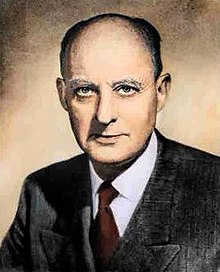Reinhold Niebuhr
| Reinhold Niebuhr | |
|---|---|
 |
|
| Born |
Karl Paul Reinhold Niebuhr June 21, 1892 Wright City, Missouri |
| Died | June 1, 1971 (aged 78) |
| Education |
Elmhurst College Eden Theological Seminary Yale University |
| Occupation | Theologian Ethicist Political Commentator Minister (1915–28) Professor (1928–60) Magazine Editor (1941–66) |
| Years active | 1915–1966 |
| Known for | Christian Realism |
| Spouse(s) | Ursula Niebuhr |
| Children | Christopher Niebuhr Elisabeth Niebuhr Sifton |
| Relatives |
|
| Notes | |
|
1964 Presidential Medal of Freedom recipient
|
|
Karl Paul Reinhold Niebuhr (/ˈraɪnhoʊld ˈniːbʊər/; June 21, 1892 – June 1, 1971) was an American theologian, ethicist, commentator on politics and public affairs, and professor at Union Theological Seminary for more than 30 years. Niebuhr was one of America's leading public intellectuals for several decades of the 20th century and received the Presidential Medal of Freedom in 1964. A public theologian, he wrote and spoke frequently about the intersection of religion, politics, and public policy, with his most influential books including Moral Man and Immoral Society and The Nature and Destiny of Man, the second of which Modern Library ranked one of the top 20 nonfiction books of the twentieth century.Andrew Bacevich labelled Niebuhr's book The Irony of American History "the most important book ever written on U.S. foreign policy." Historian Arthur Schlesinger Jr. described Niebuhr as "the most influential American theologian of the 20th century" and Time posthumously called Niebuhr "the greatest Protestant theologian in America since Jonathan Edwards."
Starting as a minister with working-class sympathies in the 1920s and sharing with many other ministers a commitment to pacifism and socialism, his thinking evolved during the 1930s to neo-orthodox realist theology as he developed the philosophical perspective known as Christian realism. He attacked utopianism as ineffectual for dealing with reality, writing in The Children of Light and the Children of Darkness (1944), "Man's capacity for justice makes democracy possible; but man's inclination to injustice makes democracy necessary." Niebuhr's realism deepened after 1945 and led him to support American efforts to confront Soviet communism around the world. A powerful speaker, he was one of the most influential thinkers of the 1940s and 1950s in public affairs. Niebuhr battled with religious liberals over what he called their naïve views of the contradictions of human nature and the optimism of the Social Gospel, and battled with the religious conservatives over what he viewed as their naïve view of scripture and their narrow definition of "true religion". During this time he was viewed by many as the intellectual rival of John Dewey.
...
Wikipedia
